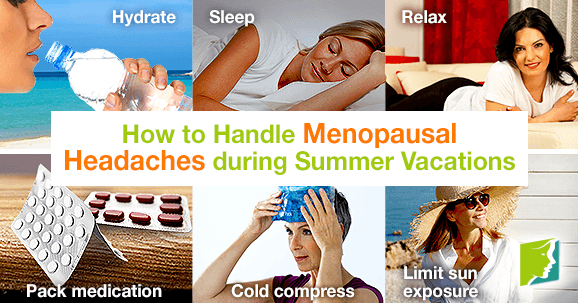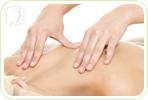Headaches are one of the most common symptoms of menopause, affecting millions of women daily. Women are more vulnerable to headaches as they approach menopause because of the instability of hormones during this transition. Estrogen causes blood vessels to dilate, and progesterone makes them constrict. When hormones fluctuate, it results in pain due to this constant expanding and contracting. Menopausal headaches can be frustrating during everyday life, and especially bothersome during summer vacations. It is important to be aware of common headache causes and helpful ways to get relief.
Menopausal Headaches
Menopausal headaches is a broad term that encompasses all types of headaches. The two most common types of headaches are tension headaches and migraine headaches.
Tension headaches are the described as the everyday headaches that typically only last a few hours. Migraines are much more severe, and are characterized by frequent, throbbing pain that starts on one side of the head. Migraines can last anywhere from a few hours to a few days.
Although hormone imbalance is the primary cause of menopausal headaches, there are additional triggers, including: lack of sleep, dehydration, skipped meals, stress and bright lights.
Managing Headaches
Hydrate
Chances are you are going somewhere hot and sunny during summer vacation. It is especially important to stay properly hydrated when outside in the heat and sun in order to prevent headaches. Keeping a cooler stocked with water is essential and can be very useful wherever you are.
Sleep
It is important to get plenty of sleep every night in order to feel your best during the day. This should remain a priority when on vacation. Maintaining a regular sleep schedule will help regulate your body and hormones, thus preventing menopausal headaches.
Relax
The whole point of a vacation is to take some time for yourself to relax and recharge. If you feel headache pain coming on, it can be very helpful to go to a dark, quiet room and lay down for a while. Bright lights and loud noises intensify headaches, so taking time away from those triggers will considerably help reduce pain.
Pack medication
It is always helpful to have pain medication on hand when traveling, because you never know when you will need it. Over the counter medication like aspirin, ibuprofen, or acetaminophen are meant to treat the pain at the source. It is helpful to take the medication right away when you start to feel pain, as it takes a while for it to take effect.
Cold compress
Keeping an ice pack or damp wash cloth around (especially if you are at the beach or outside) can be helpful for reducing inflammatory pain. Place the cold compress on your forehead or back of the neck.
Limit sun exposure
It is crucial to limit your time out in the sun if you are prone to headaches. Being outside in the sun and heat for extended periods of time can severely dehydrate you and cause painful headaches.
Menopausal headaches affect millions of women every day, and can range from mild to severe. Unfortunately, they can strike at any time - even during a much needed vacation. It is important to drink plenty of water, relax, and limit sun exposure in order to handle menopausal headaches during summer vacations.
Sources
- National Health Service Choices.(2013)."Hormone Headaches." Retrieved on December 1, 2014 from http://www.nhs.uk/livewell/headaches/pages/hormonalheadaches.aspx
- MHNI.(n.d)."Vacation Travel Reminders To Help Prevent Headaches.". Retrieved on December 1, 2014 from http://www.mhni.com/headache-pain-faq/content-disclaimer/headaches-travel




